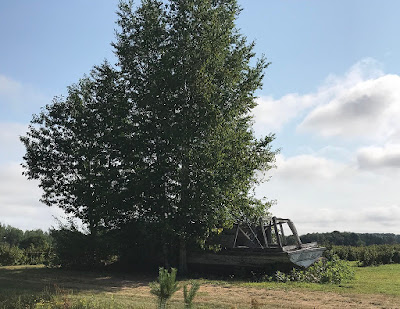 |
| Edward Hicks, Peaceable Kingdom |
God blessed Noah and his sons: He said, "Prosper! Reproduce! Fill the Earth! Every living creature -- birds, animals, fish -- will fall under your spell and be afraid of you. You're responsible for them. All living creatures are yours for food; just as I gave you the plants, now I give you everything else. Except for meat with its lifeblood still in it -- don't eat that.
"But your own lifeblood I will avenge; I will avenge it against both animals and other humans.
"Whoever sheds human blood,
by humans let his blood be shed,
Because God made humans in his image
reflecting God's very nature.
You're here to bear fruit, reproduce,
lavish life on the Earth, live bountifully!"
- Genesis 9:1-7
(translation from The Message: The Bible in Contemporary Language by Eugene H. Peterson)
If you're like me, you've heard the story of Noah and the flood lots of times, without every really noticing this section. It directly precedes the part about the God's covenant and the rainbow, and, I think, that's the part most of us remember best.
Now that I'm paying attention to verses 1-7, I'm wondering: are these
conditions for the covenant that God makes in the next section? God seems to be saying, "Behave!" The language about God's vengeance seems particularly harsh.
In fact, on closer inspection, God's admonitions here don't make much sense. They're the kind of thing that, when spoken with vehemence, can initially sound conclusive, but when you really think about it, don't follow logic:
* "All living creatures are yours for food." Why? "Because I said so."
* "[M]eat with its lifeblood still in it -- don't eat that." Why? "Because I said so."
* "Whoever sheds human blood, by humans let his blood be shed." Why? "Because I said so."
Further, I even wonder if the whole flood story isn't just a set-up, a way to introduce these rules -- sometimes referred to as the
Noachide Laws.
All in all, I don't find this situation very satisfying. These feel like some pretty crappy rules.
* * *
Since 1945, the world has been governed by some other pretty crappy rules. They fall under the general rubric of "nuclear deterrence," and they boil down to this: "Do what we say, because we can destroy you and the whole world."
At the time the atomic bomb was developed, people were still traumatized by the experience of World War I, and the recurrence of a second worldwide war, and they were desperate for a way to put an end to war once and for all. They thought this new, powerful weapon would be better than the alternative.
It seemed like a good idea at the time.
As a friend pointed out to me recently, "
Even if a foreign country attacked the US with a nuclear weapon, what would possibly be acceptable about launching a nuclear attack against one of their cities and killing hundreds of thousands, or millions, of civilians?"
Oh . . . well, right, there's that . . . . "
When I spoke on the webinar in June about the
UCC "Back From the Brink" resolution, one of the audience members commented in the chat box, "I served on a nuclear submarine. The intent was that we would never have to launch our nuclear weapons, because if we were to do so, it would mean that our mission of deterrence would have failed!" Unfortunately, that doesn't quite rise logically to meaning, "Nuclear weapons will never be used."
* * *
It seemed like a good idea at the time. I think what we can take from this episode in the flood story is that sometimes rules were made because they were the best that people could think of at the time. Rather than thinking that those rules can never be changed, we are free to use logic and come up with new rules that work even better. We can re-write old rules that were based on vengeance, and we can change the global security architecture predicated on mutually assured destruction.
Next NOAH post
Previous NOAH post
All NOAH posts
Related post:
How do you formulate a statement that can somehow convince the United
States to eliminate its threatening nuclear weapons? How do you
formulate the 10th request? Or the 100th? Knowing all the time that the
United States is in the position -- will
always be in the position -- to say, "No" ? At what point does it dawn on you that the United States will
never give up its nuclear weapons, because
it has the power and the rest of the world
doesn't?
(See
360 Degree Feedback in New York (2014 NPT Prepcom and How the World Views the United States))

 Soon,
Kazashi was able to visit the U.S. again, and we had the opportunity to
renew our friendship. He told me about his work: "When I obtained a
position at a university, it turned out to be in Hiroshima," I remember
Kazashi telling me. "So it was very natural that I became connected with
the peace movement. I became a peace worker."
Soon,
Kazashi was able to visit the U.S. again, and we had the opportunity to
renew our friendship. He told me about his work: "When I obtained a
position at a university, it turned out to be in Hiroshima," I remember
Kazashi telling me. "So it was very natural that I became connected with
the peace movement. I became a peace worker."




